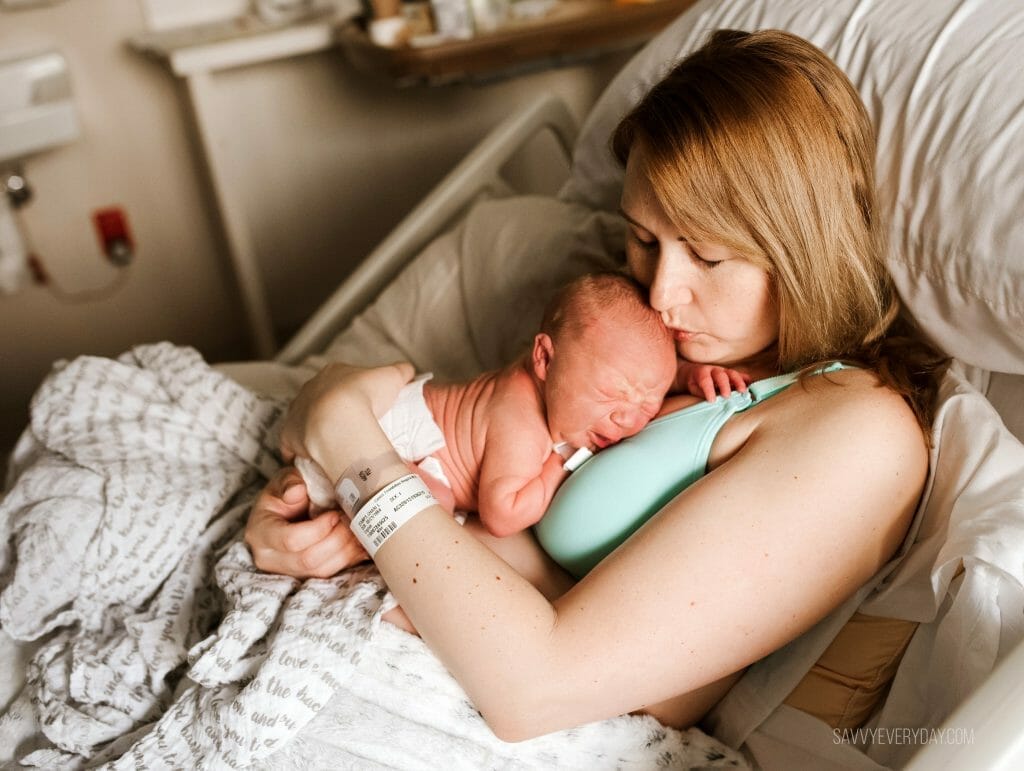What They Don’t Teach in Birthing Classes: 7 Tips to Read Before You Deliver
You’ve prepped baby’s bed, the car seat’s in the car and your hospital bag is packed (or birthing pool is set up at home). Everything is ready for when baby is born . . . but are you? One of the most important things that parents-to-be don’t learn in birth education classes is to expect the unexpected. Even if you have all the items you’re told you’ll need when baby arrives you could not be ready. Becoming a parent adds a whole new dimension to a person emotionally, physically and psychologically — you won’t be the same. So before you give birth, there are just a few more tips you need to read. Seven, actually, and I hope that these help you with one of the most magical events to take place — your child’s birth.

1. Plan For the Unplanned
Births rarely go as planned, so expect that ahead of time. But there’s something else really important that doesn’t always go as planned before you give birth — parenting styles. Before having kids, you and your other may or may not have agreed on a lot of things, but once you’ve given birth and held your baby the entire world changes, and perspectives are no longer the same. You may become an attached parent and your partner may remain the same . . . plan for that. If your partner was uninvolved during pregnancy don’t expect them to be around now that the little one is here. For some, the birth makes it all more real, but for others, they have no clue what to do with a baby and it could be years (like into toddler/preschool years) before this person suddenly connects with your child. If this person stays in your life (and even if they don’t), you will need support from outside the relationship since you won’t be getting it from within the relationship (see number 2).
2. Create a Support Network
Plan to be close to family (biological or BFF) after your baby is born. You probably won’t want everyone around you 24-7, but knowing that they are nearby if you need them is a huge help. It can be difficult to separate yourself from a newborn to shower, go to the bathroom — or even eat — both emotionally and physically (it’s demanding), but if you’ve surrounded yourself with loved ones you trust, it’s a must! Be sure to talk to each of your stand-ins about your current parenting philosophy (it will evolve over the years), and be sure that they will follow your parenting style while with your child (not forcing formula on your currently breastfeeding baby, or offering cookies to a baby who can’t eat solids yet and so on).
3. Meet New Friends
One of the best things about becoming a parent is that you can suddenly become super outgoing — you now have something in common with most people around you and you can talk about it without being weird. Go to the lactation groups (if you breastfeed at birth) and new mommy groups offered by your hospital and doctor’s office, and chat it up with some other moms. Plan some walks to get the kiddos out in the stroller, and some adult talk time mama to mama. Search for local and national groups on Facebook to ask pressing new mama questions, and get emotional support. Even if you have the support of family/friends, their parenting styles may be different from yours so it’s important that you join groups with like-minded parents.
4. Go Through the Baby Stuff Later
One thing I tell all parents-to-be at their baby showers is to leave everything from the shower (except one or two 0-3 months and 3-6 months outfits) intact until after your baby arrives. Definitely hang up the clothes and organize by size, but do not wash all your baby clothes while nesting because your baby may not fit in or wear most of them. It’s surprising how many wardrobe changes an infant goes through in a day (thank you explosive poops) and yet somehow manages to rotate through the same clothes. Why? Because when you’re a parent with poop clothes, you want to wash that ASAP and when the clothes are dry they’ll probably end up in a clean pile from which you will grab the latest outfit for your baby to soil because life is easier that way. So, only wash a few 0-3 months outfits and a 3-6 months outfit (unless you have a preemie) so that you’re prepared for whatever shape and poundage your bundle of joy may be. Going through your baby clothes and items as time passes will also allow you to return items that have obvious store or brand names, re-gift them, or try to sell the lot in a buy/sell/trade group via an app, Facebook, or the web.
5. Say Hello to Babywearing
Do you like being able to have your hands free? Then tip number five is about to save your sanity. Newborns love to be snuggled, and new moms love to snuggle . . . but sometimes you need to empty the dishwasher, get outside for a walk, make something to eat, or use the bathroom. Enter babywearing — a historic necessity for families worldwide. Thanks to wraps, ring slings, soft structured carriers, Mei Tais, and more, you can do what you need to do while working on the most important bond you’ll ever have. Local babywearing groups often offer lending libraries for parents to try different carriers with their little one before investing in one to own. These groups also offer support, instruction, and new friendships.
6. Take Your Time
Giving birth (whether via C-section or vaginally) takes a lot out of you— it changes your body! Let yourself heal and don’t put a lot of pressure on yourself to be up and running at full speed right away. Definitely don’t expect that you’ll look like you used to. Don’t even think about that. Take time to adjust to the new you — mom — because you’re now the old you but with a completely new perspective, feelings, and responsibly. It’s quite an adjustment, and not all parents can handle it. Some feel like they’ve lost themselves, so don’t forget that you’re still you, but more now.
Also, be sure to take the time to see a counselor if you’re showing signs of postpartum depression. You’re not alone, not a statistic, and doing the best thing possible for yourself and your family by seeking help to get through it. If you don’t feel instantly maternal either, don’t fret — not all parents naturally feel this way. For some, it takes counseling and classes. What’s important is that you want your child(ren) to be loved, you want them to be safe and you’re trying.
7. Savor Every Moment
Having a baby isn’t easy, but it sure is full of bliss. Savor it, because the first year passes too quickly and once your baby turns 1 he’s a toddler and becoming an independent person with an attitude all his own. The toddler/preschool years can be a struggle, just like all the nighttime wakings and teething of the first year, but it too passes, and next thing you know the kiddo will be going to high school and you’ll miss all his zany antics. Treasure the moments you have with your children, and make it count. After all, you’re molding the person they’ll become.

Photos by Emily Shores Photography.


One Comment